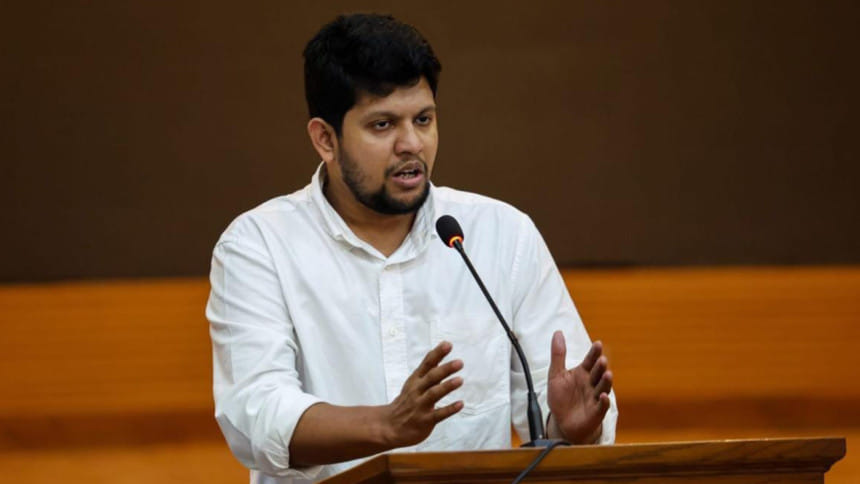Establishment excluding students to restore two-party settlement: Mahfuj Alam

Information Adviser Mahfuj Alam has alleged that the establishment is committed to reinstalling the two-party circle and excluding the students.
In a Facebook post titled "Explanation or Reality" published on his verified account this afternoon, Mahfuj also said that uniting all forces against "fascist forces and their agents" while ensuring students' "rightful stake" in both the state and the establishment will offer a redemption from this turmoil.
"Power has multiple centres of gravity. The government is held accountable for its actions, but those are often executed by other centres of power," he added, insinuating a broader web of influence over state apparatus.
Mahfuj said democratic transitions cannot be achieved through makeshift arrangements, nor can lasting political settlements be established in this manner.
"Since December, political parties have been non-cooperative. Yet they continue to hold stakes over the administration, the judiciary, and the police," he said.
Highlighting the lack of student representation in government, Mahfuj noted that there are only two student representatives among nearly three dozen advisers. He claimed even these representatives have been marginalised since the incident over the president's attempted removal.
"We two (student-representative advisers) are barely managing to balance things, but to have real influence, there must be proportionate student representation in the government," he said.
According to him, students have become fragmented like traditional political parties, leading to their reduced impact.
"That's why the Nagorik Committee was the only sustainable force for the long-term perpetuation of the uprising," he said.
Mahfuj, a former member of the defunct liaison committee of the Students Against Discrimination (SAD), also admitted that the group failed to organize students at the national level.
"The student masses of the uprising are now divided and indecisive. The civil-military bureaucracy is compromised. League influence in media and business has not been dealt with. Their political economy has not been disrupted. The old two-party settlement still prevails. The judiciary remains trapped within the two-party framework," he alleged.
He said ideological rifts between the left and the right have further weakened the movement, stating it has paved the way for cementing the dichotomy of Shahbagh-Shapla."
"The right-wing chose the wrong path of politics. Driven by emotion, they played a reactionary role in the new reality. The left, from the start, remained skeptical of the government and failed to play a strong role in favor of the uprising," he added.
Mahfuj criticized the current state of student activism, claiming it has fallen into "credit-seeking, factionalism, and quorum politics." He said allegations of financial irregularities and lack of transparency against a few individuals have demoralized the broader student-public base.
The broader student-public base could not weather the storm of financial allegations. Lack of transparency from a few individuals disseminated a sense of unease among the wider base, is what Mahfuz believes.
"The student-public alliance has failed to build institutions that support the uprising or a new civil society. They have no stake in the civil-military bureaucracy, political economy, or political alliances," he added.
Holding all stakeholders, including the government, responsible for failing to ensure justice for the injured and for not fulfilling the promises of the movement, Mahfuj said, "The prerequisites for change and inefficacy of the old settlement are restoring honesty, ideals, dedication, and unity among the students."

 For all latest news, follow The Daily Star's Google News channel.
For all latest news, follow The Daily Star's Google News channel. 



Comments